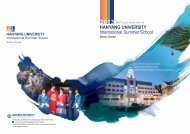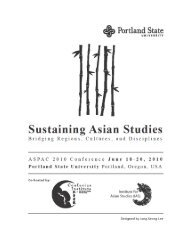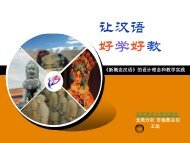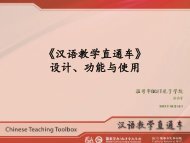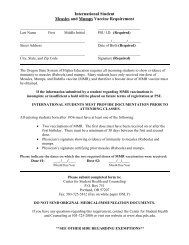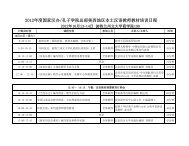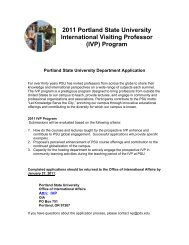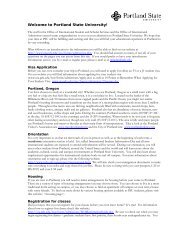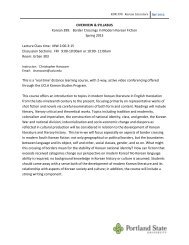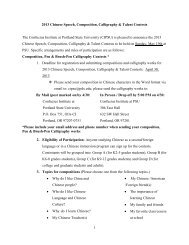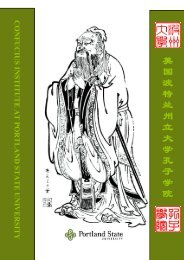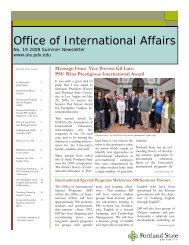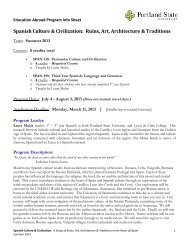ABSTRACTS - oia - Portland State University
ABSTRACTS - oia - Portland State University
ABSTRACTS - oia - Portland State University
You also want an ePaper? Increase the reach of your titles
YUMPU automatically turns print PDFs into web optimized ePapers that Google loves.
ASPAC Conference 2010<br />
June 18 – 20, 2010 | <strong>Portland</strong>, OR<br />
One representative common fact is that the two clauses are routinely utilized in the sense that the<br />
main clause occurs before the event of the subordinate clause is realized or completed. The notable difference<br />
may be explained by the possibility ofthe replacement of one clause the other. In other words, the clauses mae<br />
ni and made ni can replace each other in some cases and they should not replace each other in other cases. In<br />
this presentation the conditions for the permissible and impermissible replacement of the two clauses mae ni<br />
and made ni will be investigated with examples.<br />
~ ~ ~ ~ ~ ~ ~ ~ ~ ~<br />
Jordan Johnson<br />
Looking Forward Toward an Idealized Past: Modern Thai Buddhist Approaches to Sustainability<br />
This paper will seek to examine the ways in which prominent members of the modern Thai Buddhist tradition<br />
have sought to articulate a path toward sustainable living that is rooted in Buddhist thought. Buddhism has a<br />
great deal to say on the subject of avoiding over-consumption, and several recent Thai Buddhist thinkers have<br />
sought to employ Buddhism as a tool around which to envision a path forward for Thailand that involves<br />
both sustainable development and the creation of a just society. Recently, “socially engaged Buddhists” in<br />
Thailand have been active in constructing a picture of the “original” intent of the Buddhist tradition that is in<br />
keeping with progressive contemporary values such as sustainability and the establishment of social and<br />
economic justice. This is particularly interesting insofar as the global conversation concerning a “return” to<br />
the original intent of religious traditions tends to focus on the phenomenon of conservative religious<br />
“fundamentalists,” but here we have an example of a movement that construes the “foundations” of the<br />
Buddhist tradition to be in keeping with modern, progressive social values. By examining the writings of<br />
influential members of the Thai tradition of “socially engaged Buddhism,” this paper will critically examine<br />
the phenomenon of Thai Buddhists constructing an idealized notion of “true” Buddhism – and of Thailand as<br />
a Buddhist nation par excellence – that fits with contemporary notions of the importance of just, sustainable<br />
living.<br />
~ ~ ~ ~ ~ ~ ~ ~ ~ ~<br />
Ann Kaneko<br />
Expanding Asian Studies: Looking at Cross-Cultural Identity in Two Films<br />
As a Japanese American filmmaker, filmmaking has been a way to explore parallel experiences and expand our<br />
knowledge of the Asian diaspora. I have made two feature-length documentaries that explore cross-cultural<br />
identity in different but similar contexts than my own. Both films have been great platforms for discussing<br />
these issues and have successfully made these stories accessible to educators and students-perhaps an<br />
important direction in re-energizing and finding intersection between Asian and Asian American Studies.<br />
Overstay looks at foreign migrant workers in Japan during the late 1990s and was prompted by my<br />
interest in re-examining this country's role as a host. Japan, largely perceived as a homogenous society and the<br />
place my grandparents left behind, was experiencing growing pains, dealing with the complex cultural,<br />
economic and political implications, stirred up by these "new-comers." The film looks at six young people<br />
from Pakistan, Iran, the Philippines and Peru; and, especially, the Peruvian woman, who uses a Nikkei ("of<br />
Japanese descent") pseudonym, raises questions about Japan's reliance on blood relations.<br />
Against the Grain: An Artist's Survival Guide to Peru looks at four political artists and resistance under expresident<br />
Alberto Fujimori. One of them is Japanese-Peruvian and struggles with language differences in his<br />
own family and the backlash associated with being of the same descent as a president who had fallen out of<br />
favor. Through this character, the film looks at the Peruvian Nikkei community and Fujimori's relationship to<br />
it, as I draw parallels to my own experiences as a Japanese-American artist.<br />
~ ~ ~ ~ ~ ~ ~ ~ ~ ~<br />
Priya Kapoor<br />
Identity and Difference in Transnational Feminism: The South Asian Experience<br />
Transnational feminism is a paradigm that carefully acknowledges the contemporary free flowing movement of<br />
ideas, problematizing gender and sexuality at the intersection of nationhood, class, ethnicity and history. As<br />
17



